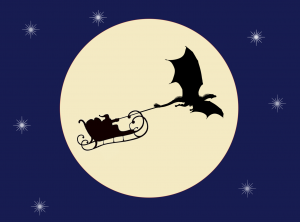Royal Rules on Rich Rectors
Last month, the Guildford Shakespeare Company put on a production of Richard II, a fascinating tale of political strife and the perils of having a leader lacking in competence when the country is in crisis. Sound familiar? In any case, this got me thinking about the name Richard and its many etymological links.
First with the name Richard. It’s borrowed from French, but it didn’t start there. In fact it is one of a number of French words that was borrowed from Germanic, deriving from Frankish *Rīkahard, meaning ‘hard/brave king’. This also gives modern German Richard and through the travels of the Goths and Vandals also made its way into Spanish as Ricardo and Italian as Riccardo. The first part of this name, the *rīk- ‘ruler’ part, in other derivations also gives words like German Reich and Dutch rijk, both meaning ‘empire’ or ‘kingdom’, which in English is also found as the ‘domain, kingdom’ suffix -ry, as in Jewry ‘the Kingdom of the Jews’. As different derivation again gives us English rich, something you’d rather expect a king to be. As a component of names it is ubiquitous in Germanic, such as in Old English Godric ‘God(ly) king’, Wulfric ‘Wolf-king’ and Theodric ‘King of the people’. This last one turns up in German as Dietrich and, again courtesy of the Franks, through French Thierry comes into English as Terry (see also my previous post on the Germans for more on this Theod-).
But it is not only Germanic languages that have this root. Indeed, some form of it crops up across the Indo-European language family, usually meaning something like ‘king’ or ‘ruler’. In Celtic (from which Germanic likely borrowed the rīk- words) we find e.g. rí in Irish and rhi in Welsh, both meaning king. In Gaulish, rulers such as Vercingetorix and Ambiorix had an earlier form –rix it as part of their name, and in a reduced form we find the same in the Welsh surname Tudor, originally meaning ‘ruler of the people’ and thus cognate with Theodric/Dietrich/Terry.
In Latin too we find rēx, again meaning ‘king’ or ‘ruler’. This form survives as such in many modern Romance languages, for example Spanish rey and French roi. We also get two separate adjectives in English: regal from Latin and royal from French. Further afield, we find this word cropping up as far away as India, in the form of Sanskrit rāja, once again a ‘king’ word, as well as rāṣṭrá, a ‘kingdom’.
All of these forms can be traced back to a form in Proto-Indo-European (the reconstructed ancestor of all of these languages), which we represent as *h3rḗǵs. In the terminology of Indo-European studies this is an ‘athematic root noun’, meaning a short root without additional derivational suffixes onto which inflectional endings such as the nominative singular *-s are suffixed directly, rather than having an additional ‘theme vowel’ *-o inbetween. As with many such forms in Proto-Indo-European, when we isolate the root itself, *h3reg-, which probably meant something like ‘stretch out the arm, direct’, we can find even more related derivations.
Adding a thematic vowel *-e/o- we get a verb which shows up in Latin as regō ‘rule, govern, direct’, along with an array of derived nouns which we have inn English. We have the agent noun rector, the instrument noun rule (from a French reflex of Latin rēgula) and the abstract noun regimen. Additionally, we have prefixed verbs such as dīrigō, ērigō and corrigō, which through their respective supine forms dīrēctum, ērēctum and corrēctum give us English ‘direct’, ‘erect’ and ‘correct’ respectively.
Germanic, meanwhile, provides us with a different set of reflexes of this verb. While we have already seen the rich set relating to wealth and kingship, the ‘straighten’ meaning of *h3reg- results in other interesting links. We have the (originally separate) verb and noun rake, a device for making straight lines, and the former participle right, originally meaning ‘straightened, directed’. Then we have reckon, perhaps a natural extension of the metaphor of lining things up in order to count them. Finally, from a causative ‘make straighten up’ we have reach (as if ‘straightening out one’s arm’).
This here is the greatest joy of etymology for me; by untangling these webs of relationships, we can show how so much of our vocabulary results from variations upon a common root. It reminds us of the continual creativity involved in using language and, by extension, the creativity of language users, i.e., humans.


